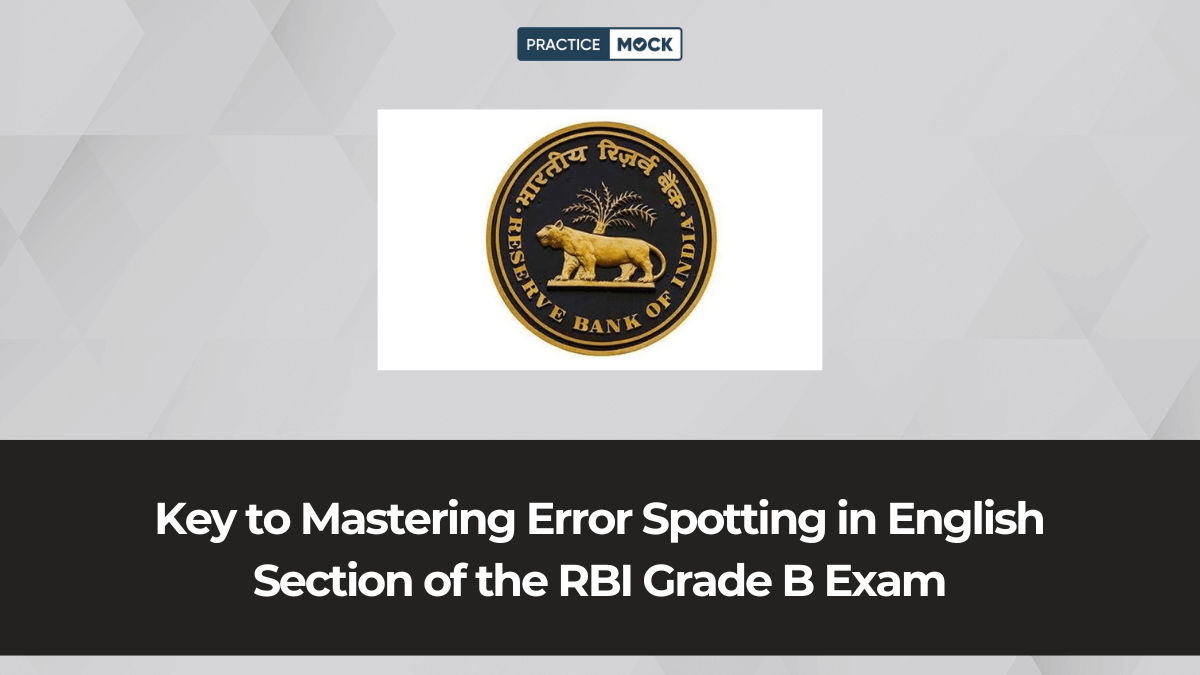A good preparation for the RBI Grade B exam means you need to have a strong command over every section. English, for that matter, is one of the most scoring sections. And, one important part of the English Language section is Error Spotting. As far as its weightage is concerned, Error Spotting typically accounts for 4 questions within the English section. Each question is worth 1 mark. So, it contributes 4 marks to the overall English Language score. This topic is a test of your grammar, sentence creation, and vocabulary power. Error Spotting usually pops up in the RBI Grade B Phase 1. Mastering this topic not only boosts your accuracy but also builds confidence in tackling other grammar-related questions. With smart strategies and regular practice, aspirants can score well in this section.
Tips to Master Error Spotting Quickly
Many aspirants struggle with Error Spotting because of weak grammar basics or confusion in sentence patterns. The following tips will help you improve accuracy, reduce silly mistakes, and approach questions with clarity and speed.
1. Build Strong Grammar Foundations
Error Spotting is all about correct grammar usage. So, it can become tough for you to find and identify errors if you don’t master the basics of grammar and don’t practice such questions every day.
Here’s what you should do:
- Master all the tenses, subject-verb agreement rules, and articles
- Learn parts of speech and how to use them correctly
- Practice daily the questions related to the common grammatical errors
- Go through Wren & Martin or other authentic Grammar book recommended by experts. Some of them are High School English Grammar & Composition by Wren and Martin, Objective General English by S.P. Bakshi, Plinth to Paramount by Neetu Singh, and English Grammar & Composition by SC Gupta.
- Watch grammar videos for better understanding
2. Practice with Previous Year Papers
The previous years’ questions can give you a clear idea of the pattern of questions asked in the exam and their difficulty level as well.
So you need to:
- Solve RBI Grade B previous year question papers
- Review your mistakes after each set (Check your mistakes after practice)
- Note down or record the common mistakes you make
- Time your practice sessions using a stopwatch on your phone
- Try your best to practice making a real exam-like setup for exam-like practice
3. Improve Reading and Sentence Analysis
Reading helps in understanding sentence flow and structure.
Make sure to:
- Go through editorials and observe how sentences are formed
- Break long sentences into shorter sentences
- Daily find grammar mistakes in newspapers
- Read slowly and understand the context
- Focus on sentence logic, not just rules
4. Use the Elimination Method Smartly
The elimination method can be a great weapon in your arsenal, while spotting the errors, dear candidate! So, whenever you get confused, eliminate those parts first that you think are ‘correct parts.’
- Identify error-free segments first
- Focus on what “sounds wrong”
- Compare all options carefully
- Don’t try to become Usain St. Leo Bolt (don’t be be in such a hurry) to mark the first error and check for tiny grammar mistakes twice
5. Revise and Take Short Quizzes
Taking brief quizzes regularly ensures that you remain ready for the exam and also allows you to check how much you’ve advanced. This learning greatly helps in improving your way of answering each question quickly with full concentration and responsibility.
Take these actions:
- Take topic-wise grammar quizzes
- Use apps like PracticeMock for serious practice
- Revise all the important or tough rules every week
- Focus on weaker areas regularly
- Keep a notebook for error types
Important Sample Questions
Here are some exam-like questions to practice to learn the art of solving such questions perfectly:
Directions: Read the given sentence to find out whether there are any grammatical/ contextual errors in them. The errors, if any, will be in two of the phrases of the sentences and the combination of those parts will be the answer to that question. If no part in the sentence has an error then, mark ‘no error’ as your answer. Consider part (E) in bold as grammatically correct. (Ignore punctuation errors if any)
Question 1
In legendary sporting careers, (A)
there comes a moment which (B)
perfectly encapsulates the (C)
champion’s relentless pursuit (D)
of transcendent brilliance. (E)
a) AB
b) BC
c) CD
d) AC
e) No error
Ans: (e)
Solution: The sentence is grammatically and meaningfully correct. Thus, (e) is the right answer.
Question 2
While the attempt by India to institutionalise (A)
exchanges and press pedal on trade, investment (B)
and development partnerships with the (C)
Central Asian Republics are timely, it is by no means (D)
the only country strengthening its ties here. (E)
a) AD
b) BD
c) AC
d) AB
e) No error
Ans: (b)
Solution:
In A – no error.
In B – Add the definite article THE before the noun PEDAL.
In C – no error.
In D – Replace the plural verb ARE with the singular IS as the subject THE ATTEMPT is singular.
So, B is the correct answer.
Question 3
With aviation fuel costs (A)
set to soar farther, Air India will (B)
need to tap into all of the Tata groups (C)
vaunted managerial expertise if it is (D)
to turn into a successful buy. (E)
a) AB
b) AC
c) BC
d) BD
e) No error
Ans: (c)
Solution:
In A, D – no error.
In B – Replace FARTHER with FURTHER (used for figurative distance).
In C – Replace GROUPS with GROUP’S (to show possession).
So, C is the correct answer.
Question 4
The competitive examination may be necessity (A)
for the distribution of educational opportunities, (B)
but it do not enable equal opportunity for those competing (C)
without the aid of social and cultural capital, (D)
inherited skills and early access to quality schooling. (E)
a) AB
b) BC
c) CD
d) AC
e) No error
Ans: (d)
Solution:
In A – Add the indefinite article A before NECESSITY.
In B and D – No error.
In C – Replace DO with DOES (subject THE COMPETITIVE EXAMINATION is singular).
So, D is the correct answer.
Question 5
States should prioritise expanding vaccine coverage, (A)
insists on masks when children are in close (B)
confines, undertook periodic testing to gauge (C)
transmission and monitor hospitalisation trends (D)
while fully reopening schools. (E)
a) AB
b) BD
c) CD
d) BC
e) No error
Ans: (d)
Solution:
In A and D – no error.
In B – Replace INSISTS with plural INSIST (subject STATES is plural).
In C – Replace UNDERTOOK with base form UNDERTAKE (imperative tone).
So, D is the correct answer.
Takeaway
If you practice following the tips and methods and tricks discussed above, keep practicing regularly through mock tests and be confident, mastering Error Spotting will become easy and as interesting as your favourite sport. So, to cut a long story short, it is regular practice, strong grammar basics, and smart solving ways that not only maximize the English score but also improve your overall performance in the RBI Grade B exam.

Join our unique Telegram group immediately to skyrocket your preparation for Regulatory exams via expert guidance, top tips, perfect feedback, and much more!
[ Click Here to join the PracticeMock Telegram Group! ]
[ Click Here to join the PracticeMock Telegram Discussion Group Link! ]
Also, go through the 60 days Study Plan for the RBI Grade B Exam 2025
Related Posts:
FAQs
Yes, it is part of the English Language section in Phase 1.
Yes, basic grammar rules are essential to spot errors quickly.
Usually, 4–5 questions are asked in this topic.
Yes, self-study with good resources is enough.
Yes, it helps in identifying wrong word usage in a sentence.
- Sign Up on Practicemock for Updated Current Affairs, Free Topic Tests and Free Mini Mocks
- Sign Up Here to Download Free Study Material
Free Mock Tests for the Upcoming Exams
- IBPS PO Free Mock Test
- RBI Grade B Free Mock Test
- IBPS SO Free Mock Test
- NABARD Grade A Free Mock Test
- SSC CGL Free Mock Test
- IBPS Clerk Free Mock Test
- IBPS RRB PO Free Mock Test
- IBPS RRB Clerk Free Mock Test
- RRB NTPC Free Mock Test
- SSC MTS Free Mock Test
- SSC Strenographer Free Mock Test
- GATE Mechanical Free Mock Test
- GATE Civil Free Mock Test
- RRB ALP Free Mock Test
- SSC CPO Free Mock Test
- AFCAT Free Mock Test
- SEBI Grade A Free Mock Test
- IFSCA Grade A Free Mock Test
- RRB JE Free Mock Test
- Free Banking Live Test
- Free SSC Live Test



